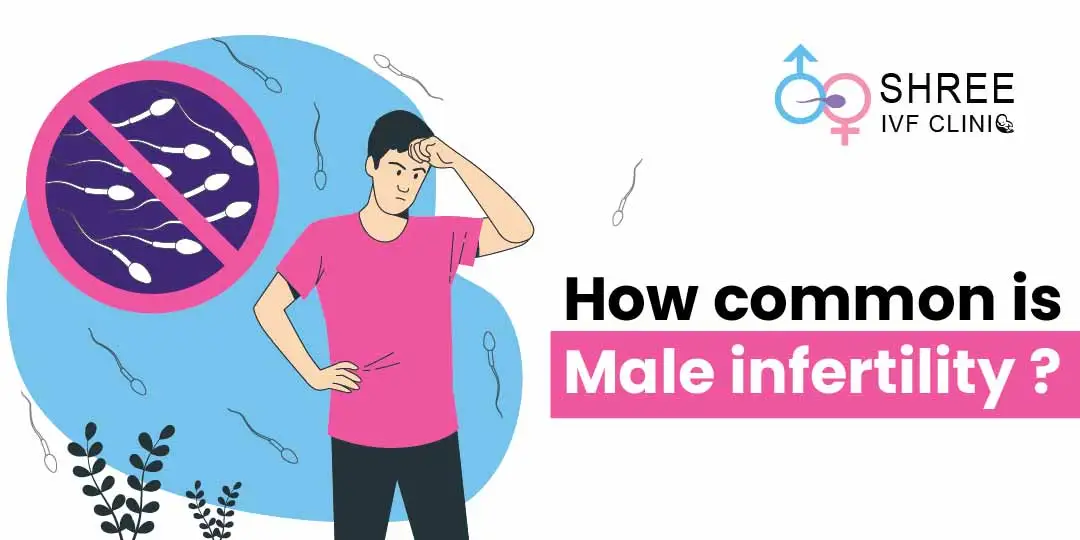How Common is Male Infertility?
UPDATED ON 12 OCT. 2022

AUTHOR
Dr Jay Mehta
Scientific Director & IVF Specialist with 10+ years of experience
CONDITION
GET IN TOUCH ON
Infertility is a problem that affects both men and women. But while infertility in women is sorely misunderstood, male infertility is often even less talked about. One in six couples experiences infertility. Male infertility is a common issue that affects those couples. Many men don’t know they have a problem until they try to have children and the process doesn’t happen naturally.
In fact, according to the Centers for Disease Control and Prevention, male infertility accounts for about half of all in fertility cases. Understanding the prevalence of male infertility can help you better understand your situation if you are struggling to conceive.
So if you’re dealing with infertility, don’t feel alone – you’re far from it. And if you’re wondering how common male infertility is, read on. We’ll go over the latest statistics and provide some insight into what can cause male infertility.
Understanding the Male Infertility Statistics
According to a recent report by WHO on the status of infertility in India, of all infertility cases, approximately 50% is due to “male factor” infertility, owing to the reproductive anomalies in the male. And according to the National Institutes of Health, about one in every 20 men has a good chance of passing on a genetic abnormality to their child.
While those numbers may seem high, it’s important to remember that they are just estimates. The actual number of men dealing with infertility is likely much higher. The reason being that many men don’t seek help for their fertility problems.
Male infertility is often seen as a taboo subject, and many men feel embarrassed or ashamed to talk about it. As a result, only a small percentage of men who are having difficulty conceiving will ever seek professional help.
So while the numbers may not be completely accurate, they do give us a general idea of how common male infertility is. And it’s important to remember that even if you are dealing with infertility, there are still options available to help you have the family you’ve always wanted.
What can cause Male Infertility?
There are many different factors that can contribute to male infertility. Some of the most common include:
- Low sperm count:
A low sperm count is one of the most common causes of male infertility. A sperm count is considered low if there are fewer than 15 million sperm per millilitre of semen.
Also Read : How To Increase Sperm Count?
- Poor sperm quality
In addition to a low sperm count, poor sperm quality is another common cause of male infertility. Poor sperm quality means that the sperm are not able to swim as well as they should or that they are abnormally shaped.
- Varicocele
A varicocele is a condition in which the veins in the testicles become enlarged. This can cause the temperature in the testicles to increase, which can impact sperm production.
- Hormone imbalances
Hormone imbalances can also play a role in male infertility. Testosterone is the hormone responsible for sperm production, and an imbalance can lead to problems with fertility.
- Genetic abnormalities
Genetic abnormalities can also impact fertility. One example is Klinefelter syndrome, a condition that affects about one in every 500 men. Men with this condition have an extra X chromosome, which can lead to a low sperm count and poor sperm quality.
Also Read : Causes of Low Sperm Count and Watery Sperm
- Infections
Infections of the reproductive organs can also cause male infertility. infections like chlamydia and gonorrhea can damage the sperm-carrying tubes and lead to problems with fertility.
- Celiac disease
Celiac disease is a condition that affects the digestive system. It is caused by an intolerance to gluten, and it can impact fertility in men by causing damage to the reproductive organs.
- Erectile dysfunction
Erectile dysfunction (ED) can also be a sign of underlying fertility problems. ED is defined as the inability to get or maintain an erection long enough for sex. It can be caused by a variety of factors, including stress, anxiety, and hormonal imbalances.

4062+
353K
” Every individual and couple’s journey is unique, and
finding the right solutions tailored to their specific
circumstances can make all the difference “
Why Male Infertility is on the rise in India?
The incidence of male infertility is on the rise in India. There are a number of factors that can contribute to this, including:
- Changing lifestyle habits: These days, more and more men are leading sedentary lifestyles. This means that they are not getting enough exercise, and they are also not eating healthy diets. Both of these factors can impact fertility.
- Environmental pollution: Environmental pollution is another factor that can contribute to male infertility. Studies have shown that exposure to pollutants like lead and mercury can lower sperm count and motility.
- Stress: Stress is another common factor that can impact fertility. When a man is under a lot of stress, it can impact his hormones and reduce sperm production.
As you can see, there are many different factors that can contribute to male infertility. If you are a man struggling with infertility, don’t despair.
There are treatments available that can help you overcome this problem and have the family you’ve always wanted. Talk to male infertilty treatment doctor about your options, and don’t give up hope. Male infertility is a relatively common problem, and there are many success stories out there. You could be one of them.
AUTHOR
Dr Jay Mehta
Scientific Director & IVF Specialist with 10+ years of experience
CONDITION
CALL US 24/7 FOR ANY HELP
GET IN TOUCH ON
Share Article on
Recommended Reading
Is Azoospermia the same as Aspermia?
Aspermia results in complete lack of ejaculation in men, while azoospermia results in no sperm in the ejaculate
Can I get Pregnant Naturally if my Husband has Azoospermia?
Azoospermia means there’s no sperm in a man’s after ejaculate. If you wish to have a family but have azoospermia, ART therapies may be able to help
Patient’s complete guide to Obstructive Azoospermia
If you’re like most people, you probably don’t know much about uterine fibroids. You may have heard the term before, but you’re not exactly sure what they are or what they do.








